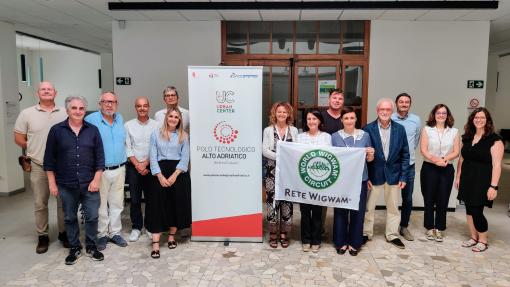On Friday, July 5, 2024, the seminar "The Issue of Transboundary Waters" and the kick-off meeting of the WABIN project, co-financed by the European Union under the Interreg VI-A Italy-Slovenia Program, took place at the Urban Center of Trieste.
Morning: Round Table on the Challenges of Transboundary Waters
The morning session, open to the public, was dedicated to a round table focusing on the challenges and critical issues related to transboundary waters. The opening of the event was entrusted to the lead partner of the project, the Alto Adriatico Technology Park, with greetings from Director Franco Scolari and an introduction to European cooperation projects by Diego Santaliana. The presence of the Regional Councilor for Environmental Protection, Sustainable Development, and Energy, Massimo Canali, provided a territorial dimension to the meeting, where the importance of collaborations and bridges between transboundary institutions for the sustainable management of water resources was reiterated. There was also a greeting from the Interreg Italy-Slovenia project management controller.
The speakers included: Federico Dal Col from OGS National Institute of Oceanography and Experimental Geophysics, Goran Visintin from the University of Ljubljana, Giulia Casalena from OGS, Kostja Jlabjan from Energ+ d.o.o. Clera One, Pierluigi Barbieri from the University of Trieste, and Efrem Tassinato, President of Wigwam Clubs Italia APS.
Afternoon: Presentation of the WABIN Project
In the afternoon, the project partners outlined the work plan and delved into the WABIN project through the presentation of its objectives, planned actions, indicators, and the roles of the various partners. The event was an important opportunity for discussion, culminating in a day rich in presentations and constructive discussions.
Objectives and Outputs of the WABIN Project
The WABIN project aims to promote the sustainable management of water resources and the protection of aquifers by integrating methodologies applied at the hydrogeological basin level with predictive water balance models. The main objectives include:
- Sustainable Water Resource Management: Using predictive models to estimate the use of water resources.
- Inclusive Participation: Promoting participatory tools to address climate change and water-related risks.
The main expected outputs include:
- Integrated Methodological Package: Characterization of hydrogeological basins in relation to the effects of climate change.
- Dynamic Modeling: 3D hydrogeological models of the Isonzo basin for water balance and future predictions.
- Transboundary Memorandum of Understanding: Strategy for the management of water resources through public-private cooperation.

